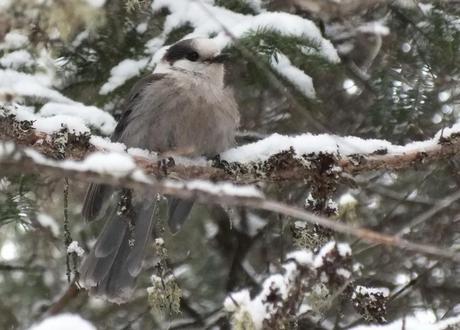
Bob and I spent three days skiing and hiking on various trails in Algonquin Provincial Park, trying to make the most of the last weeks of winter here in Ontario. We love to go looking for birds and animals, but in this case, on the Opeongo Road, the Gray Jay (Perisoreus canadensis) came looking for us.
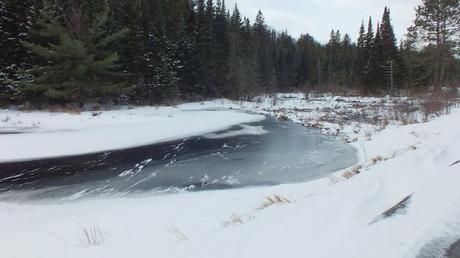
The drive in from Highway 60 took us past a frozen marsh bisected by a good-sized stream. A day earlier, the inky black waters were flowing freely, but a severely cold overnight temperature had solidified the water to a glassy, windswept surface.
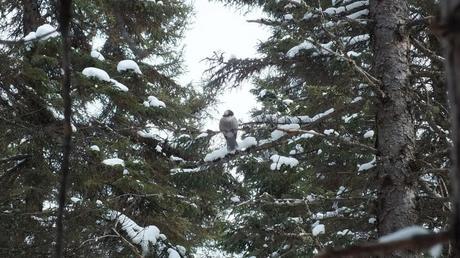
Someone had provided an offering of bird food at the edge of the small parking lot, but a fresh snowfall had rendered the seeds difficult to find. Nevertheless, Black-capped Chickadees as well as Red-breasted Nuthatches were repeatedly returning to the modest scattering of seeds, while a Gray Jay sat obscurely on a branch above all the activity.
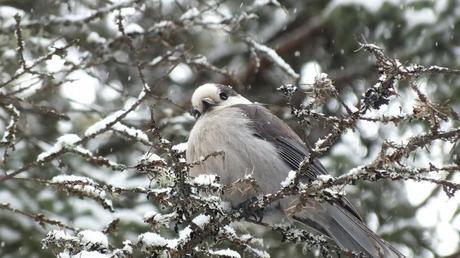
Bob and I promptly removed some peanuts and sunflower seeds from our knapsack, to try to entice the Gray Jay to eat out of our hand. Gray Jays are also referred to as Grey Jays, Canada Jays and Whiskey Jacks.
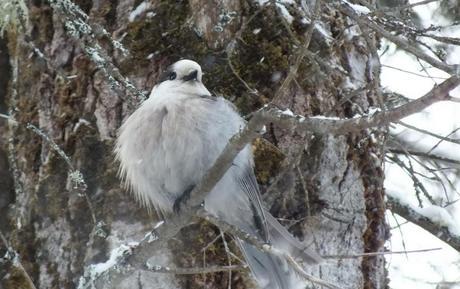
Gray Jays typically have fluffy plumage, a short bill, and a long tail. Being a very frigid and windy morning, the Gray Jay was puffed up against the cold to try to maintain its body heat.
As you see in Bob’s short video, the Gray Jay did not mind the cold windy weather.
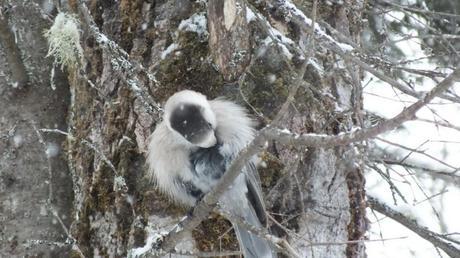
As we observed the Gray Jay, it took on the task of preening its feathers. I was able to observe a red band around one leg when a ray of sunshine peeked through the clouds.
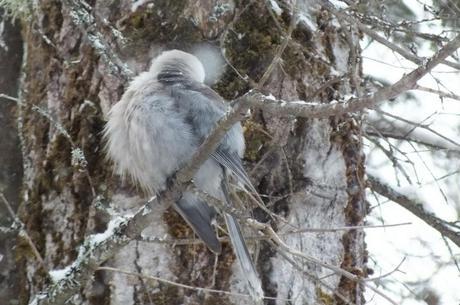
Gray Jays typically live in coniferous and mixed wood forests where there are Black, White or Engelmann Spruce trees, or Jack or Lodgepole Pine trees. These particular types of trees enable Gray Jays to store food up in under the pliable scales of bark where it will remain dry and well-concealed. Cold temperatures are also a requirement for the preservation of their perishable food.
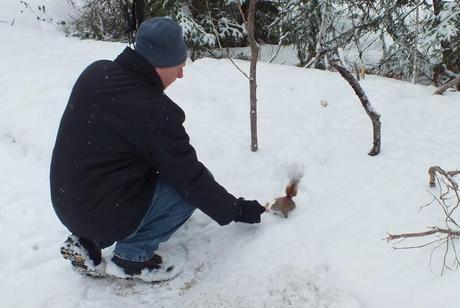
A curious Red Squirrel scoured the ground looking for scraps before sampling one of Bob’s peanuts in the shell.
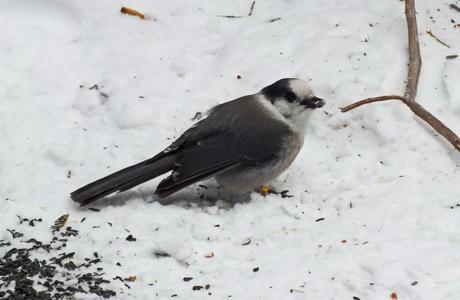
In the meantime, a second Gray Jay appeared and swooped in for some of the black oil sunflower seeds laying on the ground. We were able to distinguish it from the other bird because this one had a yellow band on its leg.
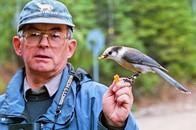
A friend of our family, Dan Strickland, has been studying Gray Jays in Canada since 1967. From 1979 to 2000, Dan was Chief Park Naturalist in Algonquin Provincial Park, and has a long list of other wildlife that he has studied over the years.
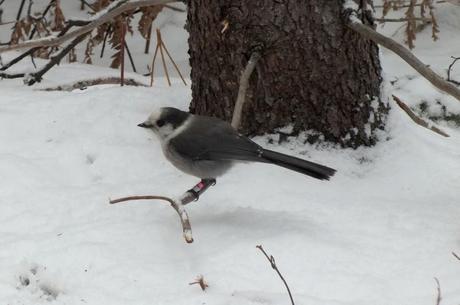
During those years, Dan has done major research on Gray Jays, work that still continues. Today, Dan is considered the world’s leading expert on Gray Jays, and according to “The Science Behind Algonquin’s Animals“, his and Algonquin Provincial Park’s research into Gray Jays “is now considered one of the world’s longest-running investigations of a population of color-banded birds”.
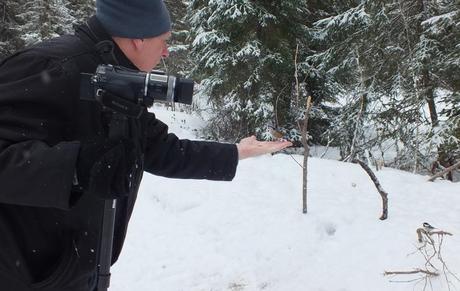
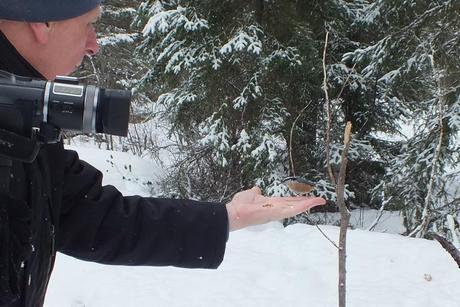
As Bob patiently waited for one of the Gray Jays to feed from his hand, a Red-breasted Nuthatch (Sitta canadensis) perched briefly on one of his fingers and quickly selected several small pieces of broken nuts.
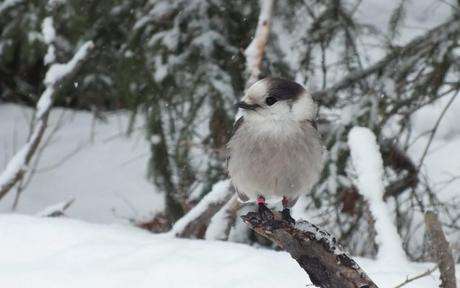
Gray Jays are notoriously friendly and curious, and often will follow hikers along a trail, begging for treats along the way.
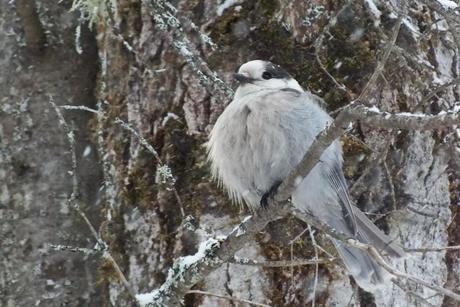
Eventually Bob succeeded in enticing one of the Gray Jays to take food from his uplifted palm, but I was not quick enough to snap a photo. The other Gray Jay, however, was content to remain on its perch. Perhaps it had already eaten well earlier that morning.
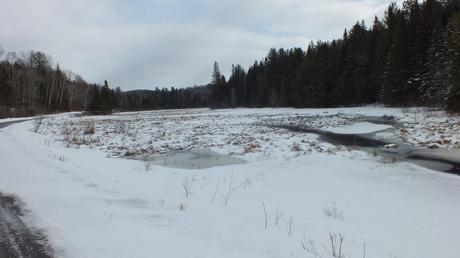
As Bob and I drove back towards Highway 60, we scanned the frozen marsh and stream for any evidence of the Pine Marten and the otters that live there. They both eluded us that day.
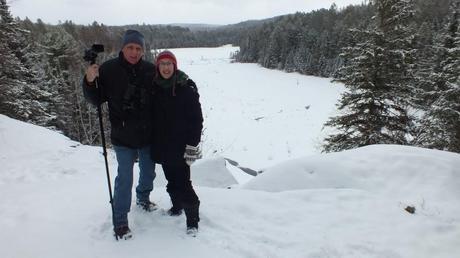
In our next blog posting, we hike on the Beaver Pond Trail in Algonquin Provincial Park, in search of wild Otters.
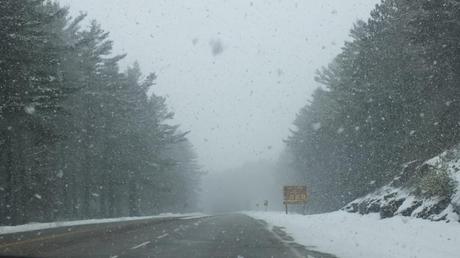
Meanwhile, the cold wind continued to whip up the snow, and winter seemed far from over.
Checkout some of our other Algonquin Park bird sightings:
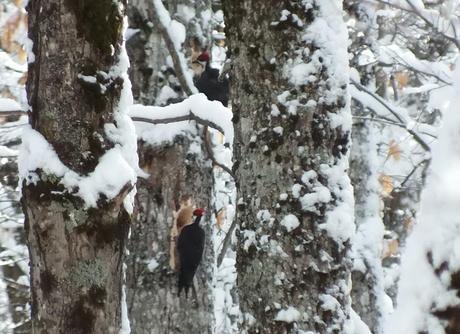
Two Pileated Woodpeckers Sighted Together in Algonquin Provincial Park
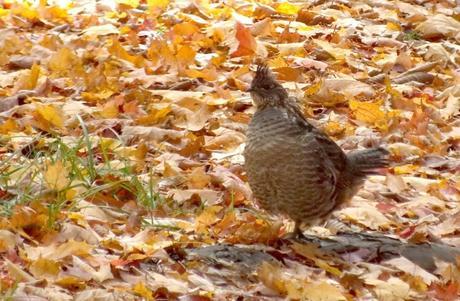
Ruffed Grouse Sighting in Algonquin Provincial Park
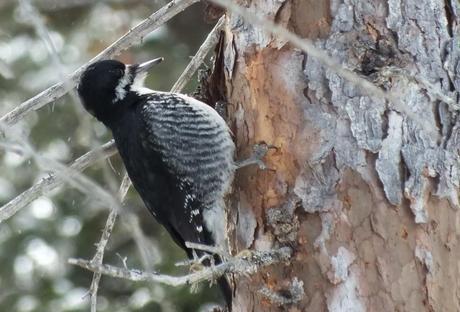
Black-backed Woodpecker Sighted in Algonquin Provincial Park
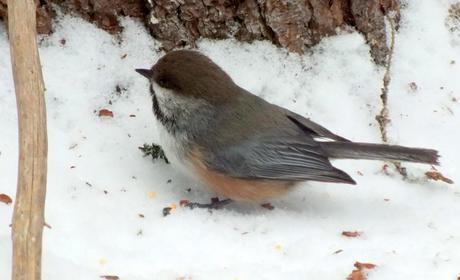
Boreal Chickadees Sighted in Algonquin Provincial Park
Frame To Frame – Bob & Jean
Gray Jay Sighting on Opeongo Road in Algonquin Provincial Park is a post from: Frame To Frame

